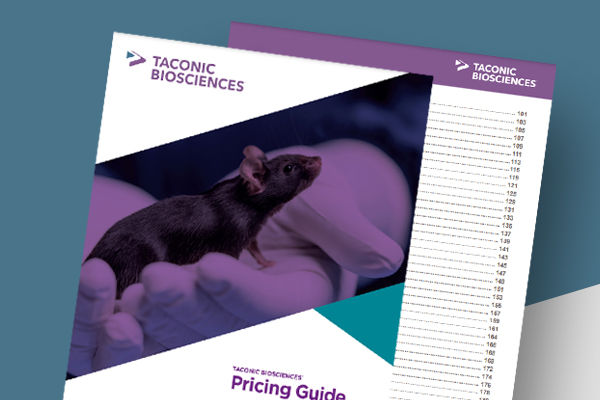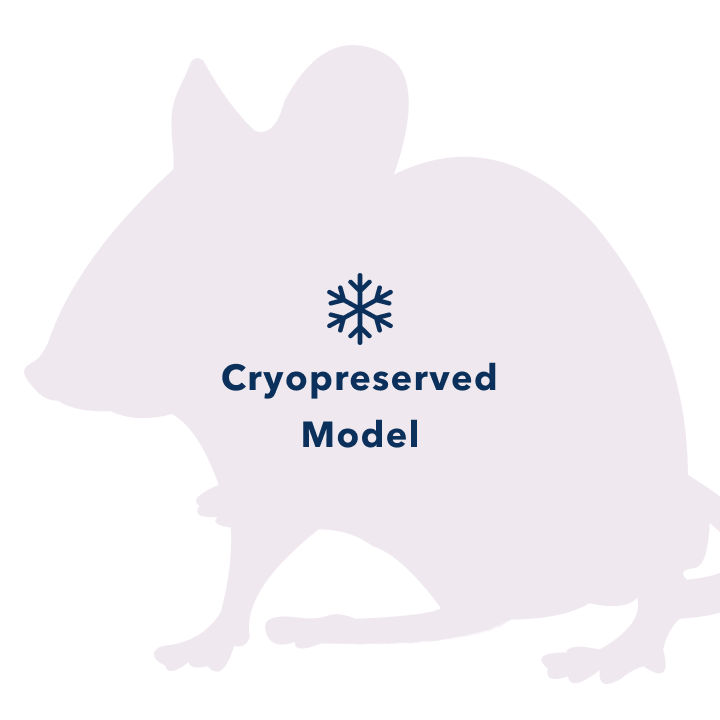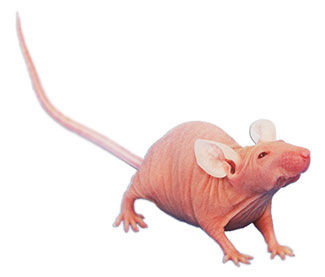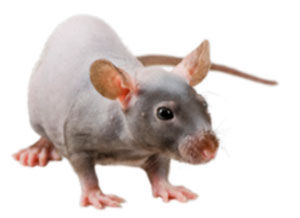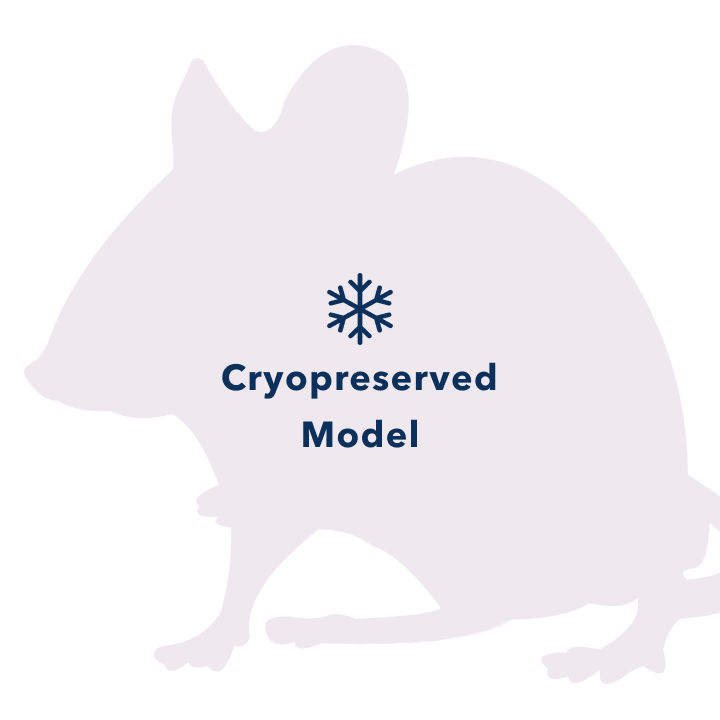| Model No. | Nomenclature | Genotype |
|---|---|---|
| NMRINU-F | BomTac:NMRI-Foxn1nu | sp/sp |
| NMRINU-M | BomTac:NMRI-Foxn1nu | sp/sp |
| NMRINU-F | BomTac:NMRI-Foxn1nu | sp/wt |
| NMRINU-M | BomTac:NMRI-Foxn1nu | sp/wt |
NMRI nude
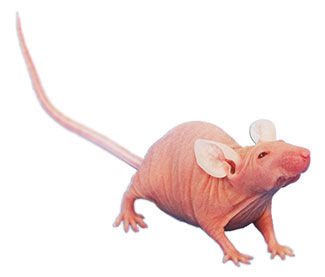
- Description
- Data
- Growth Chart
- Price & Licensing
- Health Report
- Overview
- Genetics
- Guides & Publications
- Applications & Therapeutic Areas
- Transit, Housing & Welfare
- Diet
Overview
Nomenclature: BomTac:NMRI-Foxn1nu
- Widely-used as host for transplanted human tumors and for therapeutic studies on human tumors
- Excellent reproductive performance
- The NMRI nude has a relatively low take-rate for human breast tumors compared to other nude or immunodeficient mice
- The autosomal recessive nude gene in homozygous (sp/sp) mice causes the lack of fur and an abnormal thymus. The deficiency in T cell function allows athymic mice to accept and grow xenografts as well as allografts of normal and malignant tissues.
- Heterozygous (sp/wt) mice carry only one copy of the nude mutation and have hair. Heterozygous nudes were originally thought to have normal immune systems, but in fact have immune alterations such as reduced bone marrow stem cells and lower thymus weights. Heterozygous nudes may thus not be appropriate for use as sentinels. They may be used in PK/dosing studies.
Origin
The NMRI nude Spontaneous mutant model was developed by Lynch. Poiley of the National Institutes of Health (NIH) received stock from Lynch in 1937. The mice were inbred as NIH/P1. The Naval Medical Research Institute (NMRI) received stock from Poiley. Zentralinstitut für Versuchstierzucht in Hannover Germany (Han) received stock from NMRI. The mice were random bred. M&B A/S (now Taconic) received stock from Han in 1961 and again in 1985. The mice are maintained as an outbred stock.
Genetics
Guides & Publications
Applications & Therapeutic Areas
- Cell and Tissue Humanized
- Immunology
- Inflammation
- Oncology & Immuno-Oncology
Transit, Housing & Welfare
Need more info? Click the live chat button or Contact Us
Packing Practices
Taconic standard practice is to recombine animals of different home cages and/or ages from a single model and sex during packing, except in specific cases where Taconic's animal welfare policy prohibits recombination due to aggression or other concerns. When an order is fulfilled with animals from more than one week of birth, this standard practice results in animals from a range of birth weeks packed together in a single TTC. When an order is fulfilled with animals from genotyped models, this standard practice results in animals from different home cages packed together in a single TTC.
Customers who wish to keep animals from different weeks of birth separated should place orders with the special instruction "Divide and label by age." Note that this special request can result in increased costs for additional Taconic Transit Cages, dividers and/or freight charges.
Taconic discourages other types of custom packing requests as they can have a negative impact on animal welfare. Learn more.
Diet
Data
Average litter size: 8
Characteristics:
The main characteristics of the NMRI nude mouse are the absence of the thymus and absence of hair due to impaired keratinization resulting in breakage of the hairs within the follicles. There is a general agreement that the hairless condition and the failure of thymus development are due to some basic defect in the embryonic ectoderm, and the first detectable abnormalities in the development of the nude thymus are in the ectodermal component occurring during the formation of a cervical vesicle on day 11 of embryonic life.The immune system is characterized by: a small population of T cells; the antibody response is confined to IgM class; response to T cell dependent antigens is low; a compensatory increase in the level of natural killer cells resulting in a slightly increase in the level of NK cells in comparison to normal NMRI mice.
Husbandry and Breeding Data:
- Breeding: Although many nude mice on inbred background might be difficult to breed and rear due to the increased susceptibility towards infections, the NMRI-nu mouse seems to be more resistant to infections and may in some instances be kept under conventional conditions for a shorter period. The breeding is carried out by mating homozygous males with heterozygous females. Approximately 50% of the offspring is heterozygous and 50% is homozygous.
The gnotobiotic NMRI-nu mice are bred in a production isolator. Large scale production takes place in laminar air flow barrier breeding units reserved for this purpose alone. The animals are kept under constant temperature 22 + 2°C, relative humidity (55 + 5%) and at a day-night cycles of 12 hours light (6 am - 6 pm) and 12 hours dark. - Skin and Hair: It is more appropriate to characterize the condition of the nude as a recurrent development loss of hair due to imperfect keratinization in the hair shaft. Although studies using conventional histology have shown no particular abnormal appearance of the epidermis of nude mice (Flanagan, 1966), studies using electron microscope have revealed that the keratinization processes are obviously deeply impaired (Köpf-Maier et al., 1990). The vibrissae are present in all fetuses at 16th day of gestation, but at birth the nude mice can be differentiated from heterozygotic littermates by the appearance of the vibrissae. In the nude mice the number of whiskers are less than in the normal littermates, and those which are present are bent and coiled. Please note that NMRINU model is reported to have sparse hair growth at an early age and will be lost at around 6 weeks of age and this cycle repeats as they age (PMID: 11599924 DOI: 10.1006/exmp.2001.2386).
- Immunology: Immune deficient athymic nude mice are highly susceptible to infections with facultatively pathogenic viruses and bacteria. It is therefore indispensable during breeding and experimentation of nude mice to protect them from possible infections. Mouse hepatitis virus and Sendai virus infection cause chronic wasting disease and shorten lifespan in nude mice (Fujiwara, 1982).
Colitis, colonic hyperplasia, diarrhoe, and rectus prolaps may be caused by Citrobacter freundii and possible other enterobacteria (Bieniek & Tobermeyer 1976, Barthold et al. 1977). Abscesses in nude mice may be caused by Staphylococcus aureus, Proteus spp, Pasteurella pneumotropica, or Group G Stretococcus (Rygaard 1973, Dagnæs & Bisgaard 1990, Dagnæs et al. 1991).
Application in BioMedical Research:
- Human Tumor Xenografts: Soon after the discovery of the nude mutation, it was recognized that one of the most promising research areas with the nude mouse was the study of heterotransplantation of human tumors (Povlsen 1977). Due to the high reproductive performance and high vigor, the Bom:NMRI-nu strain has gained a widespread use as host for transplanted human tumors and for therapeutic studies on human tumors, transplanted to nude mice (Povlsen 1978, Fogh & Giovanelli 1978, Fogh & Giovanelli 1982, Spang-Thomsen & Visfeldt 1977, Spang-Thomsen 1985, Engelholm 1987, Bowen & Winnograd 1991). Many cultured human tumor cell lines have been characterized by their ability to induce tumors in nude mice (Fogh et al 1977).
Compared to other nude mice or immune deficient mice, the NMRI-nu mice has a relative low take rate for a human breast cancer (Dagnæs-Hansen et al 1992). Maruo et al (1982) found that the tumor growth rate of human gastric cancers was high in outbred nude mice (NIH) compared to nude mice on a inbred background (BALB/c, C57BL/6J). - Immunotoxicology and Teratotoxicology: Recently it has been suggested that immune deficient animals should be included in toxicological studies of xenobiotics and in safety testing of immunoreactive pharmaceuticals (Svendsen et al. 1987, Juul et al. 1992). Fetal rat limbs buds grafted in athymic mice might also be used for the testing of teratogenicity of drugs (Shiota et al 1990).
For some applications, weight may be critical. For orders where weight is critical, please place orders by weight, not by age. Taconic can accept orders by weight for this model. For orders sourced from US or Denmark a production minimum 3 gram span is accepted. All weights are weights at time of packing. Mice and rats can lose weight in transit. Orders for specific weight spans will be assessed a nominal fee. More detail on weight order policies is available.
n= 80 per sex at RF health standards from EU colonies. Data collected 2013-15.
High and Low represent mean +/- 2 standard deviations.
Based on sample size the charts above represents ~75% of the population.
All growth curves represent animals housed in our barriers, at our standard density and fed NIH31-M diet. Variations at customer facilities will alter expected growth curves.
Growth charts are provided only as a guide, if a specific weight criteria is needed please order animals by weight.
Customize this chart by clicking the legend elements.
- Licensing
- Pricing - USD
- Pricing - EUR
- Pricing - EUR Nonprofit
- Select my Health Standard
- Get Custom Pricing Guide
Licensing
Terms of Sale and Use for NMRI nude
These models are sold subject to Taconic's Terms and Conditions for Taconic's Models, Products and Services
Pricing - USD
Opportunist Free (OF) Health Standard
NMRINU Female
NMRINU-F Genotype sp/sp
Available now
| Age in Weeks | Quantity 1 - 999 |
|---|---|
| 3 to 5 | $ 155.00 |
| 6 to 8 | $ 194.00 |
NMRINU-F Genotype sp/wt
Cohorts are reserved upon order placement and will take 4-8 weeks to fulfill. An estimated lead time will be provided to you within 2-3 business days.
| Age in Weeks | Quantity 1 - 999 |
|---|---|
| 3 to 5 | $ 79.00 |
| 6 to 8 | $ 102.00 |
NMRINU Male
NMRINU-M Genotype sp/sp
Cohorts are reserved upon order placement and will take 4-8 weeks to fulfill. An estimated lead time will be provided to you within 2-3 business days.
| Age in Weeks | Quantity 1 - 999 |
|---|---|
| 3 to 5 | $ 155.00 |
| 6 to 8 | $ 194.00 |
NMRINU-M Genotype sp/wt
Cohorts are reserved upon order placement and will take 4-8 weeks to fulfill. An estimated lead time will be provided to you within 2-3 business days.
| Age in Weeks | Quantity 1 - 999 |
|---|---|
| 3 to 5 | $ 79.00 |
| 6 to 8 | $ 102.00 |
Pricing - EUR
Opportunist Free (OF) Health Standard
NMRINU Female
NMRINU-F Genotype sp/sp
Available now
| Age in Weeks | Quantity 1 - 999 |
|---|---|
| 3 to 5 | 93,00 € |
| 6 to 8 | 98,00 € |
NMRINU-F Genotype sp/wt
Cohorts are reserved upon order placement and will take 4-8 weeks to fulfill. An estimated lead time will be provided to you within 2-3 business days.
| Age in Weeks | Quantity 1 - 999 |
|---|---|
| 3 to 8 | 40,00 € |
NMRINU Male
NMRINU-M Genotype sp/sp
Cohorts are reserved upon order placement and will take 4-8 weeks to fulfill. An estimated lead time will be provided to you within 2-3 business days.
| Age in Weeks | Quantity 1 - 999 |
|---|---|
| 3 to 5 | 93,00 € |
| 6 to 8 | 98,00 € |
NMRINU-M Genotype sp/wt
Cohorts are reserved upon order placement and will take 4-8 weeks to fulfill. An estimated lead time will be provided to you within 2-3 business days.
| Age in Weeks | Quantity 1 - 999 |
|---|---|
| 3 to 8 | 40,00 € |
Pricing - EUR Nonprofit
Opportunist Free (OF) Health Standard
NMRINU Female
NMRINU-F Genotype sp/sp
Available now
| Age in Weeks | Quantity 1 - 999 |
|---|---|
| 3 to 5 | 74,00 € |
| 6 to 8 | 81,00 € |
NMRINU-F Genotype sp/wt
Cohorts are reserved upon order placement and will take 4-8 weeks to fulfill. An estimated lead time will be provided to you within 2-3 business days.
| Age in Weeks | Quantity 1 - 999 |
|---|---|
| 3 to 8 | 37,00 € |
NMRINU Male
NMRINU-M Genotype sp/sp
Cohorts are reserved upon order placement and will take 4-8 weeks to fulfill. An estimated lead time will be provided to you within 2-3 business days.
| Age in Weeks | Quantity 1 - 999 |
|---|---|
| 3 to 5 | 74,00 € |
| 6 to 8 | 81,00 € |
NMRINU-M Genotype sp/wt
Cohorts are reserved upon order placement and will take 4-8 weeks to fulfill. An estimated lead time will be provided to you within 2-3 business days.
| Age in Weeks | Quantity 1 - 999 |
|---|---|
| 3 to 8 | 37,00 € |
Select my Health Standard
Need help choosing the right Taconic Biosciences health standard for your research?
Use the Health Standard Selector to enter your exclusion list. The tool will tell you which health standards meet your requirements.
Get custom pricing guide
Schedule A Scientific Consultation
Speak with a PhD-level Field Application Scientist who can help you select the most appropriate model and maximize your experimental success.
Related Models
Smart Select Program
Trial an Animal Model for Quality & Compatibility Assurance
As longtime facilitators of animal-based research, we understand the importance of aligning your project goals and procurement priorities to support advancements in your research.
- Evaluate a specific model strain, before making any financial investment
- Request up to 20 animals from one of the strains listed below, to test for quality, consistency, and suitability for your experimental purpose
- Enjoy free ground shipping, where applicable (see table for more details)*















.jpg)

.jpg)
.jpg)
.jpg)
.jpg)





.jpg)


.jpg)
.jpg)

.jpg)


.jpg)





.jpg)

.jpg)



